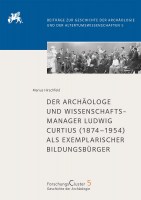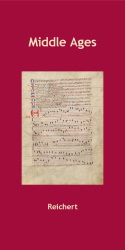Search
Der Archäologe und Wissenschaftsmanager Ludwig Curtius (1874–1954) als exemplarischer Bildungsbürger
2023
21.0 x 29.7 cm, 218 p., 2 illustrations b/w, paperback / softback
ISBN: 9783752007947
21.0 x 29.7 cm, 218 p., 2 illustrations b/w, paperback / softback
59,00 €
ISBN: 9783752007947
Short Description
Marius Hirschfeld's biographical study "Der Archäologe und Wissenschaftsmanager Ludwig Curtius (1874–1954) als exemplarischer Bildungsbürger" examines the behaviour, mentality and ideologies of the (right-wing) (educated) middle classes between the German Empire and the early Federal Republic based on the life of the busy political archaeologist Curtius. As a university professor of classical archaeology, director of the German Archaeological Institute in Rome and successful science manager, Ludwig Curtius was at the centre of this powerful population group.Description
Marius Hirschfeld's biographical study "Der Archäologe und Wissenschaftsmanager Ludwig Curtius (1874–1954) als exemplarischer Bildungsbürger" examines the behaviour, mentality and ideologies of the (right-wing) Bildungsbürgertum between the German Empire and the early Federal Republic based on the life of the busy political archaeologist Curtius.Ludwig Curtius is a vivid example of this powerful population group, as his socialisation, his studies and the start of his career all took place in the German Empire. He regarded Friedrich Naumann as his political mentor and took his first political steps in his Nationalsozialem Verein. As a 39-year-old professor, he enthusiastically volunteered for military service in 1914 and experienced the entire war as an artillery and intelligence officer. Throughout his life, Curtius described Weimar democracy as an "error of well-meaning theorists". He was politically active in the DNVP and experienced the end of the republic as director of the DAI-Rome. Forced into early retirement by the National Socialists in 1937 as a "German nationalist", he partially aligned himself with the regime in the following years and spent the period up to the end of the Second World War in relative peace in Rome. After 1945, he finally took part in the self-exculpatory discourse of post-war German society with his bestselling autobiography "Deutsche und antike Welt".
The german Bildungsbürgertum was one of the most influential population groups in the German Empire. It determined social discourse and led it. This remained the case despite all the upheavals of the first half of the 20th century and despite the narrative of its own decline. Lifelong education, the classical humanist educational canon and the resulting perception of possessing a "higher insight" into the connections between history and politics were the constants through which it developed its power and legitimised its social significance. As a university professor of classical archaeology, director of the German Archaeological Institute in Rome and a successful „Wissenschaftsmanager“, Ludwig Curtius was at the centre of the Bildungsbürgertum. His life is used to trace the behaviour, development, ideas and mentality of this population group across four German states.
Biographical Note
-Marius Hirschfeld, born on 06 October 1986.-Studied history, classical archaeology and political science at the University of Trier.
-Doctorate at the University of Trier under Prof Christian Jansen on the topic "Der Archäologe und Wissenschaftsmanager Ludwig Curtius (1874–1954) als exemplarischer Bildungsbürger". Funded by the Gerda Henkel Foundation, the German Historical Institute Rome and the Research Department of the University of Trier.
-Since 2022: Wissenschaftlicher Volontär at the Upper Silesian Museum in Ratingen (Hösel).
Main areas of research: First World War, history of the bourgeoisie, history of classical archaeology, history of East Central Europe.




 Table of Contents
Table of Contents

 Neuerscheinungen 2023/2024
Neuerscheinungen 2023/2024
 Gesamtverzeichnis 2023/2024
Gesamtverzeichnis 2023/2024
 Katalog Oriental Studies & Linguistics
Katalog Oriental Studies & Linguistics
 Mittelalter
Mittelalter
 Deutsche Inschriften
Deutsche Inschriften
 Musiktherapie
Musiktherapie
 Literaturen im Kontext
Literaturen im Kontext